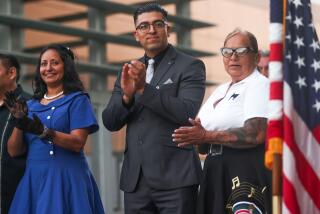Commentary : Minor Candidates, Major Concerns
- Share via
Why would anyone want to become a “minor” candidate for mayor and run for office when the chances of winning are zero? What is the thinking of candidates who have little or no money, no deep-pocket “political” backers, no endorsements? Why does one decide to challenge the well-financed or millionaire opponents who proclaim themselves the “front-runners”?
When Roger Hedgecock resigned as mayor, 16 candidates came forward to enter the special Feb. 25 primary to replace him.
Why did 16 candidates enter the race for mayor? A bigger question is, why did almost 65% of the registered voters stay away from the polls, and why did far too many believe the race for mayor was either a zoo, a circus or both?
The sincere among the “lesser known” candidates knew that the odds of winning were long. To win would be a bonus. The real objectives were to be at the razor’s edge of key community issues and concerns, to try to effect change, to offer voters an alternative to the beauty and popularity contests of past elections.
Within the “circus” is a tragic separation of the major and minor candidates--the overt and covert keeping of the “lesser” candidates from attending social, civic and public election forums. This would seem a clear violation of fair political conduct.
Shame, humiliation, frustration and fierce determination marked these “minor” candidates as they struggled against this “political apartheid.”
It is no secret that the City Council is a closed “private club” of the San Diego elite. Communications between this club and the constituents of the districts are so poor that the San Diego Chamber of Commerce complained about the fact in its last report, a side issue in this primary.
This conflict among the council, the candidates for council and the community (especially community planning groups and town councils) has deep, bitter roots. For example, in one district, virtually all the community leaders are handpicked or appointed to community council seats. These “appointees” are kept in line by welfare or federally funded handouts. At election time, traditionally they are treated to “catfish,” “watermelon” and “mustard green” election rallies. Another district’s elected council representative has not been seen in the community for the past three months. He is under grand jury investigation after being accused of misusing his city credit card.
In front of the “circus,” there is a city, which at first glance looks like the “front-runners”--healthy, prosperous. The real city is expressed by voices heard only during election time from the “minor” candidates.
Beyond this appearance of a political circus is a commonly voiced protest by both citizens and candidates against a city government riddled by deceit and conceit at all levels, from the Planning Commission to the Housing Authority to the Port Authority.
A majority of the “primary candidates” felt that voter turnout might drop as low as 20% or lower because of dissatisfaction over grand jury indictments, criminal probes and other charges and countercharges.
Also beyond the election circus is a city with no skipper at the helm and an acting skipper under criminal investigation. The community seethes with public outcries of “no trust” in past or present elected officials. There is anger at the waste of scarce tax dollars to pay for special elections and court-appointed attorneys to defend elected officials.
The city is about to sprawl into a concrete jungle with no clear policies or creative programs for water management, traffic jams, environmental pollution, zoning and community planning. Unemployment among blacks and Latinos is 20%, and higher among youths. There is a critical lack of low- and middle-income housing; 75% of the junkyards, hazardous-waste dumps and chemical firms are concentrated within two residential districts.
Beyond the circus, a city with increasing drug traffic is in constant conflict with public safety officials. Crimes of rape, robbery and burglary now keep a once-quiet community on the brink of open war with hoodlums and street gangs.
Senior citizens are forced to live in firetrap hotels while people by the hundreds sleep on sidewalks and in doorways and parks. Border crime continues to rise.
All the sincere “minor” candidates have a common reason for challenging the odds against us--our mutual concern for the welfare of our community. We are all intimate with the problems, the agony, the needs and desires of this city. We did run to win.
But, in our defeat, we express the agony of the city so that it will be placed on the agenda of the new mayor and the City Council. Have we not won a larger victory in behalf of those who have no voice in government?
More to Read
Sign up for Essential California
The most important California stories and recommendations in your inbox every morning.
You may occasionally receive promotional content from the Los Angeles Times.













